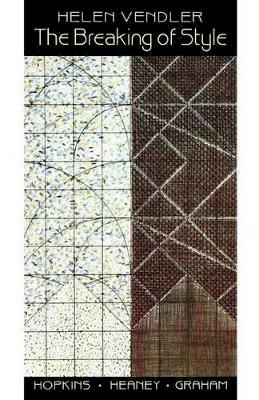
The Breaking of Style: Hopkins, Heaney, Graham
Helen Vendler
Style is the material body of lyric poetry, Helen Vendler suggests. To cast off an earlier style is to do an act of violence to the self. Why might a poet do this, adopting a sharply different form? In this exploration of three kinds of break in poetic style, Vendler clarifies the essential connection between style and substance in poetry. Opening fresh perspectives on the work of three very different poets, her masterful study of changes in style yields a new view of the interplay of moral, emotional, and intellectual forces in a poet’s work.
Gerard Manley Hopkins’ invention of sprung rhythm marks a dramatic break with his early style. Rhythm, Vendler shows us, is at the heart of Hopkins’ aesthetic, and sprung rhythm is his symbol for danger, difference, and the shock of the beautiful. In Seamus Heaney’s work, she identifies clear shifts in grammatical “atmosphere” from one poem to the next—from “nounness” to the “betweenness” of an adverbial style—shifts whose moral and political implications come under scrutiny here. And finally Vendler looks at Jorie Graham’s departure from short lines to numbered lines to squared long lines of sentences, marking a move from deliberation to cinematic “freeze-framing to coverage, each with its own meaning in this poet’s career.
Throughout, Vendler reminds us that what distinguishes successful poetry is a mastery of language at all levels—including the rhythmic, the grammatical, and the graphic. A fine study of three poets and a superb exposition of the craft of poetry, The Breaking of Style revives our lapsed sense of what style means.
Product Details
About Helen Vendler
Reviews for The Breaking of Style: Hopkins, Heaney, Graham
A. O. Scott
The Nation
Helen Vendler is justly admired as the author of critical studies of George Herbert, Keats, W. B. Yeats, and Wallace Stevens. Her current project is a study of Shakespeare’s sonnets. She is also the most influential reviewer of contemporary poetry in English: her reviews of new books of poetry appear frequently and forcefully in The New Yorker, The New York Review of Books, The New Republic, Parnassus, and other journals… [H]er gifts are so immense… The new books [Soul Says, The Given and the Made, and The Breaking of Style] have a number of such [acute] analyses, continuously alert to the detail of the poems… One of the pleasures of reading Vendler’s criticism is that of seeing a poet’s achievement lavishly appreciated… The most valuable chapters in the three new books are those in which Vendler leads us through difficult poems… After [she does so], the poem is still to be read, and read again, word by word, line, sequence, image cut into image. We have to get back from the discursive model, which Vendler so clearly describes, to the local movement and texture of the poem. But after Vendler’s commentary we are in a much better position to do so. I cannot think of a better justification for a critic’s work.
Denis Donoghue
New York Review of Books
It is the mark of [Vendler’s] greatness as a critic that, when there is a conflict between the schematism and the poem, it is the schematism which must give way. The critic must be faithful to the poem, not to her preconceptions… Her readings of individual poems are rarely less than exemplary… The kind of thing [Vendler] is after is clear enough—the sort of poetry after which ‘the world never seems the same again.’ Of all critics, she seems one of those best qualified to find it.
Roger Caldwell
Literary Review
There is perhaps no better critic than Vendler who can tell us so well how poems are made.
Clyde de Loache Ryals
Studies in English Literature, 1500–1900
In the collections of essays The Breaking of Style and The Given and the Made Helen Vendler…firmly positions herself as one of our most authoritative voices on modern and contemporary poetry. Already an authority on Keats and Stevens among others, Vendler moved several years ago into the realm of contemporary poetry, where she has quickly established herself as a major critic. Vendler has always been a skilled practitioner of close reading, but in the essays of these two volumes she becomes an articulate apologist for the intensive attention to details of style and form that has come to be identified with New Criticism. Eschewing the current hegemony of theory in literary scholarship, Vendler makes the case in these essays that not only is there still a place for an exclusive engagement with the details of textual analysis, but to fail to address the details of a poem’s making is to ignore its physical presence.
Mary Kaiser
World Literature Today
